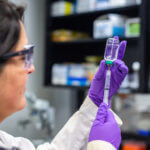
Anyone who is sexually active with more than one partner may have concerns about becoming infected with HIV. Anywhere from 40 to 90 percent of people who are infected with the virus will experience flu-like symptoms about a month or two after becoming infected. These symptoms are referred to as ARS or acute retroviral syndrome. There are some people who will not experience any symptoms for years, at times even up to a decade, after they were infected.
Most commonly a person who has been exposed to HIV will not experience any symptoms during the early stages of the disease. Approximately one out of every five people who are infected with HIV do not know that they have it. This is why testing is extremely important, especially if you are having unprotected sex with multiple partners or if you are using intravenous drugs. Here are some symptoms for both men and women that could be a sign that you are HIV positive.
1. Fever
Running a fever is a common symptom of many different types of ailments. It could mean that you simply have a cold or the flu or it could be a sign of something more serious. One of the very first signs of Acute Retroviral Syndrome is running a mild fever. Typically, the fever will be low grade, up to 102 degrees Fahrenheit. If a person develops a mild fever at all as a result of HIV, it is often accompanied by several other symptoms.
This may include a sore throat, swollen lymph nodes, or fatigue. The reason for the fever is that the virus has started to move into the bloodstream. During this time it starts to replicate fairly quickly. When this occurs the immune system has an inflammatory reaction, thus causing the body to heat up. While running a fever obviously does not mean that you have HIV, it can be a sign that something is wrong.


